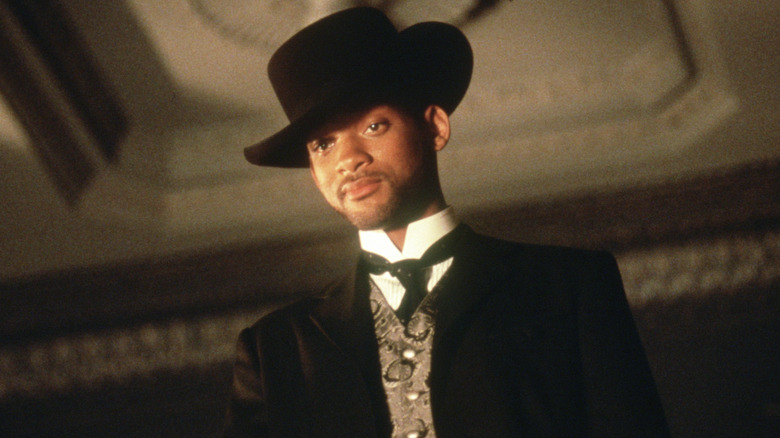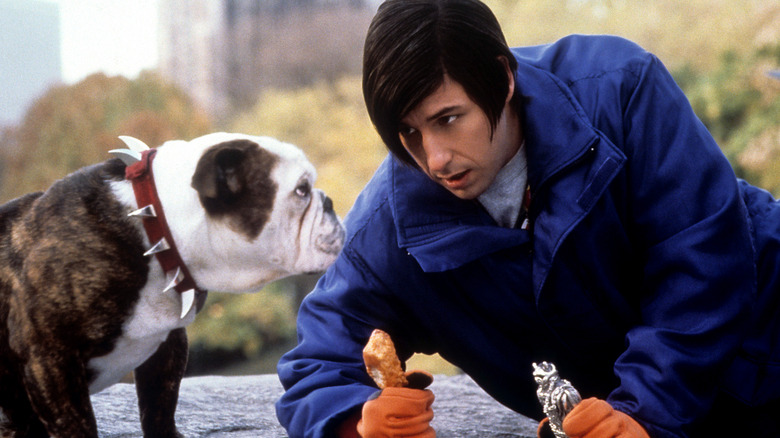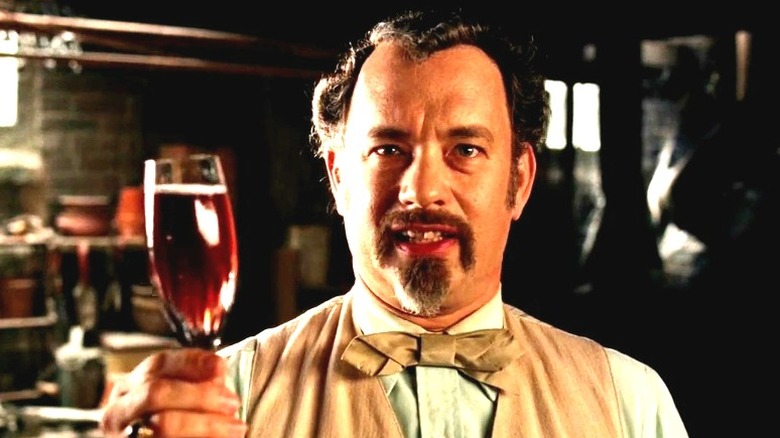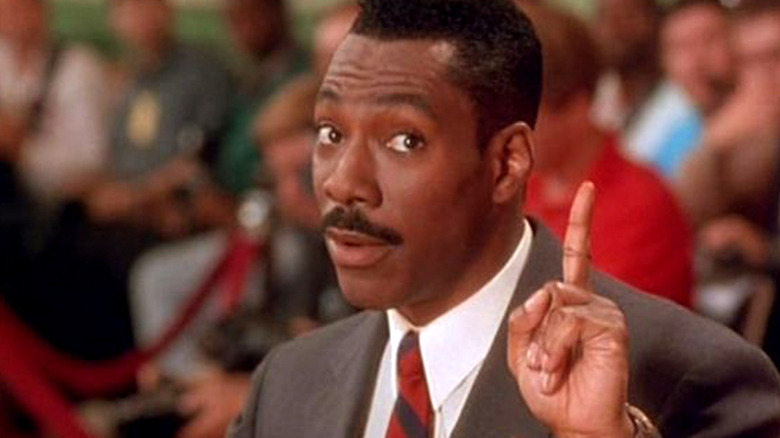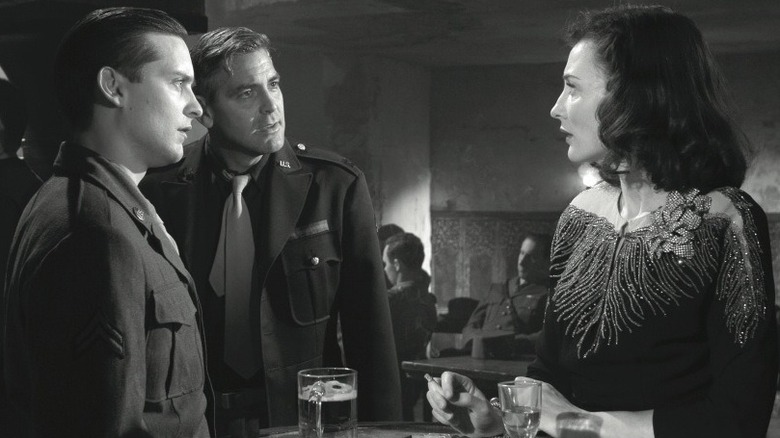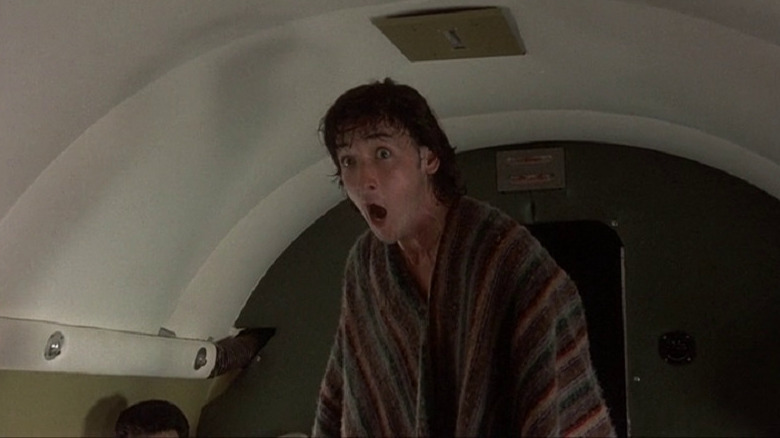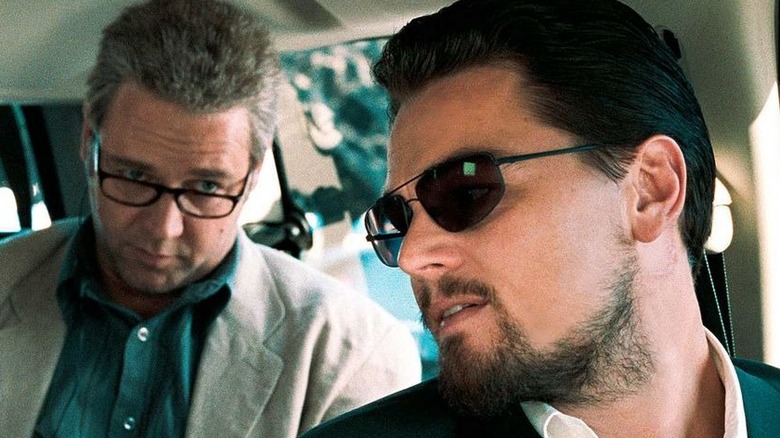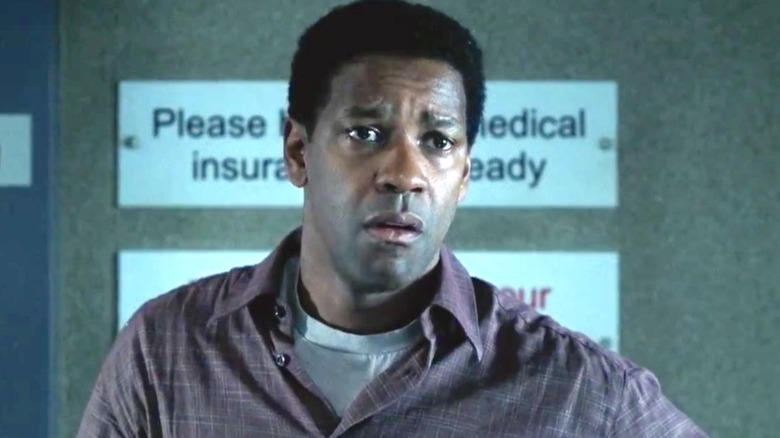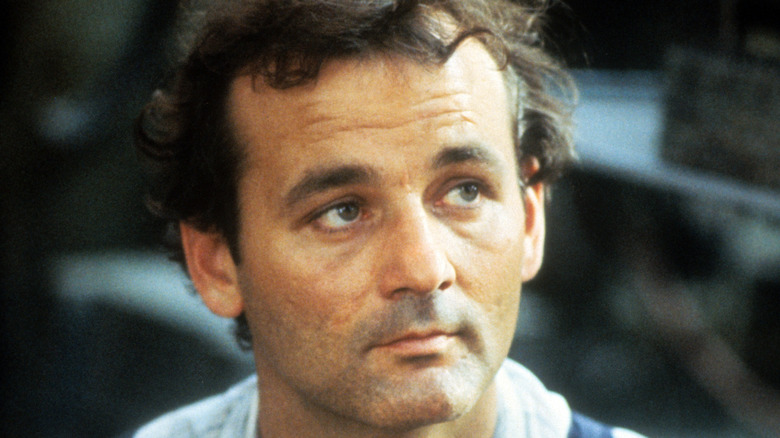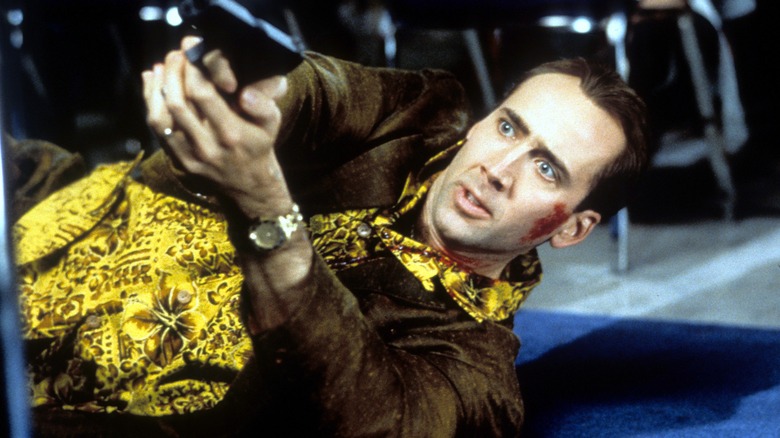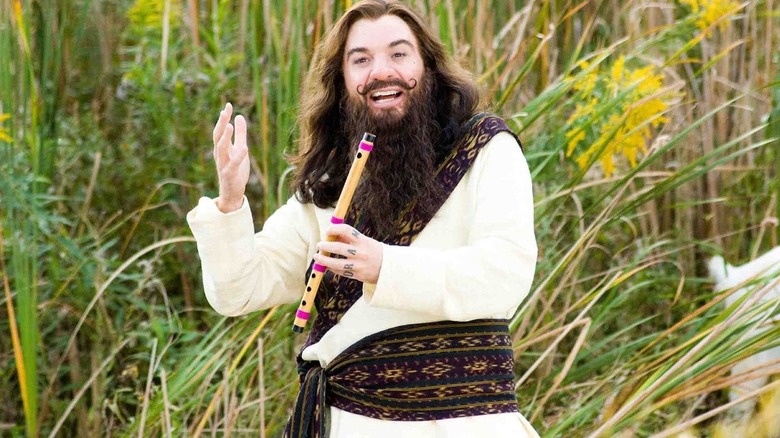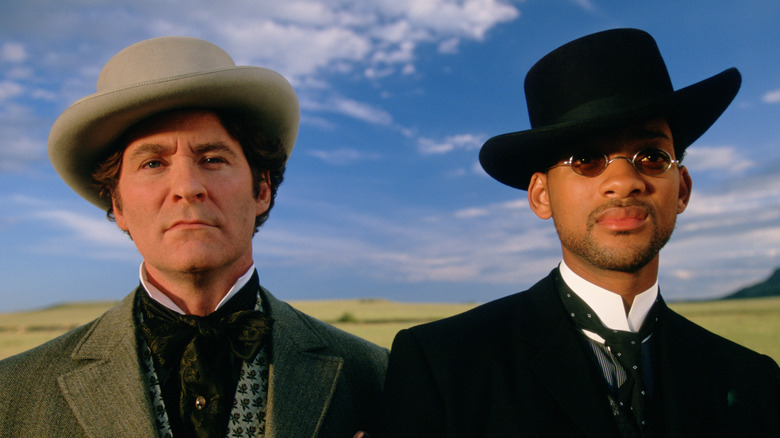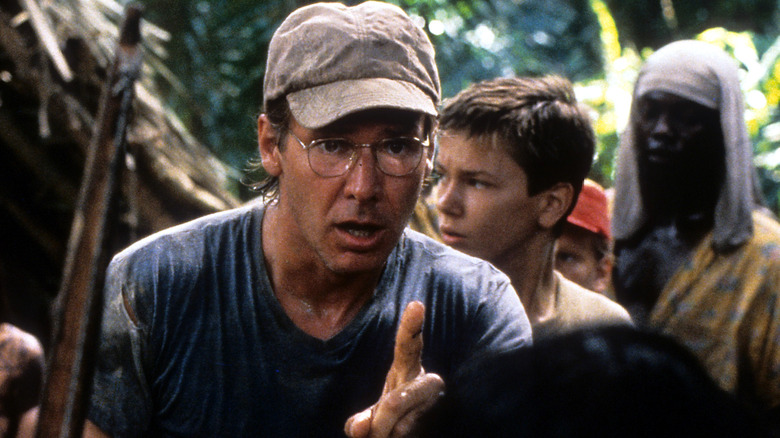Movies That Ended An Actor's Winning Streak
Not long ago we delved into movies that pulled actors out of a rut in their careers, ending a professional losing streak they had been on for one reason or another. Unfortunately, the reverse can also happen, where an actor is in a period where things have been going great, and then — bam, that one movie comes along and derails everything. It rarely spells the end to their career, but losing that momentum and having to rebuild it again can be tough.
To be clear, not all of the movies in this feature are necessarily bad movies — though many certainly are. Instead, what unites them all is that they came after the actor in question just had a number of successful projects in a row and was on a hot streak, and then cooled that hot streak with a movie that was either critically panned, fell flat on its face at the box office, or both. While every actor on this list continued working for many years after the movie in question — and some still had career-best work ahead of them — for several it marked the end of their highest level of fame and clout, which they never quite seemed to reach again after releasing said film.
Little Nicky -- Adam Sandler
Though not his first movie, "Billy Madison" marked the beginning of the movies that were considered "Adam Sandler movies" — films that he co-wrote and was clearly granted a large amount of creative freedom on. While only a modest box office success at the time, "Billy Madison" helped to grow Sandler's fanbase beyond what it had been when he was just a "Saturday Night Live" cast member and had fans eager to see what he would do next.
Over the course of the next four films that Sandler would star in, co-write, and work on with the same core group of collaborators — "Happy Gilmore," "The Wedding Singer," "The Waterboy," and "Big Daddy" — each one did progressively better than the one before it, and soon Sandler was one of the highest-paid actors in Hollywood. He appeared in other films that were hit or miss, but as far as "Adam Sandler movies" went, he seemed to be able to do no wrong. It was that box office clout that had New Line Cinema willing to spend $80 million on Sandler's high-concept 2000 comedy "Little Nicky," full of elaborate sets and costly special effects.
Unfortunately, his most expensive film to date would also be his first big flop, not to mention his worst-reviewed effort up to that point. He bounced back just fine, but "Little Nicky" definitely dulled the shine on Hollywood's comedy golden boy and he never fully reached that status again.
The Ladykillers -- Tom Hanks
There are a select few actors who are known for barely making any bad movies — Daniel Day Lewis, Christian Bale, and Meryl Streep all come to mind. But it's hard to think of an actor who had the run that Tom Hanks did from 1992 to 2002. Starting with "A League of Their Own" and up through "Catch Me If You Can," Hanks starred in a remarkable 14 consecutive films that were well-received by critics and did well at the box office, four of which earned him Best Actor Oscar nominations and two for which he won.
Then came 2004's "The Ladykillers," which not only brought Hanks his worst reviews in over a decade but was also a rare misstep for the Coen brothers, who wrote and directed. What should have been an exciting moment for film — Hanks teaming with the Coens — ended up being a disappointing and forgettable project for all three of them. To be fair, the Coens don't always hit it big at the box office even with their best films, so "The Ladykillers" being a flop wasn't necessarily unheard of for them. But bad reviews are, and it remains the only Coen brothers movie to earn a rotten score on Rotten Tomatoes. To be fair, Hanks couldn't have known he was signing on for their worst movie, but it's the one he got and it brought his amazing streak to an end.
The Distinguished Gentleman -- Eddie Murphy
People joining the cast of "Saturday Night Live" in the hope of becoming movie stars first started with Eddie Murphy. While not technically the first "SNL" alum to have a hit movie, Murphy set the template for how to successfully emerge from the show a fully-formed movie star who immediately cranked out hits for almost the entire first phase of his film career.
To be fair, Murphy did have his first dud by way of 1984's "Best Defense." But that was originally a Dudley Moore vehicle that was struggling in test screenings, so the studio filmed some disjointed scenes with Murphy to shoehorn into an already-completed film. After that, Murphy resumed his star-making run that previously began with "48 Hrs." and "Trading Places," firing off "Beverly Hills Cop," "The Golden Child," "Beverly Hills Cop II," the concert film "Raw," "Coming to America," "Harlem Nights," "Another 48 Hrs.," and "Boomerang" — all of which were either commercial successes and/or have gone on to become undeniable cult classics.
Then, in 1992, Murphy released the political comedy "The Distinguished Gentleman," the first critical and commercial disappointment he was in since "Best Defense." Going forward, he'd make several bad movies for every good one, marking the end of the golden touch that dominated the first decade of his movie stardom.
The Good German -- George Clooney
Not counting his pre-TV-fame film career, which consisted of mostly forgettable B-movies, George Clooney's transition to Hollywood after becoming a household name on "ER" was spotty at first. For every "From Dusk till Dawn" and "Out of Sight" there was a "Batman and Robin" and "One Fine Day." But he soon established himself as a reliable and consistent A-lister as the '90s drew to a close, helped along by becoming a go-to collaborator for filmmakers like Robert Rodriguez, Steven Soderbergh, and the Coen brothers.
After his disastrous turn as Batman, followed by the decent but forgettable thriller "The Peacemaker," 1998's "The Thin Red Line" kicked off a long string of success for Clooney. This was further elevated by his becoming a respected filmmaker in his own right, beginning with "Confessions of a Dangerous Mind" in 2002. Not only was he leading big box office wins like "Ocean's Eleven" and "The Perfect Storm" during this time, but he got Best Director and Original Screenplay Oscar nominations for "Good Night, and Good Luck," plus his first and thus far only acting Oscar for his role in "Syriana" — a part that literally almost killed him.
Then came "The Good German" in 2006 which, according to Rotten Tomatoes, is the second-worst movie Steven Soderbergh ever directed — and it brought an abrupt end to star Clooney's hot streak that had been burning for the previous nine years.
Hot Pursuit -- John Cusack
John Cusack's relationship with Hollywood has been strained for many years now, particularly in the last decade or so. It mostly seems to be by his own choice, with the actor not willing to play the games that he says you need to play in order to remain an A-lister. His current attitude toward Tinseltown is a stark contrast from what it was when he was a teenaged and young adult actor in the '80s, leading a number of movies which were either hugely successful at the time or have gone on to become bona fide cult classics that retain passionate fanbases to this day.
Only three movies into his career, Cusack landed a small role in John Hughes' coming-of-age gem "Sixteen Candles," then scored his first top-billed credit in the beloved cult classic "Better Off Dead." Next was the critically-acclaimed "The Journey of Natty Gann," followed by a handful of other great films — which included "Stand by Me" as well as Cusack's second collaboration with filmmaker Savage Steve Holland, "One Crazy Summer" — that announced a definite young star on the rise. It wouldn't be until 1987's "Hot Pursuit" that Cusack was dealt the first critically panned and subsequently completely forgotten movie of his career. Now, he still had "Say Anything..." just around the corner so his ascent resumed just fine, but "Hot Pursuit" was nonetheless a major black mark on an almost perfect first batch of films.
Body of Lies -- Leonardo DiCaprio
Though he made some questionable choices in the '90s as he was still carving out his career, Leonardo DiCaprio soon got a lot more picky in the 2000s — and his output over the last 20 years has been nearly flawless as a result. It helps that he's made movies almost exclusively with some of the most acclaimed filmmakers around, most frequently with Martin Scorsese, but also Steven Spielberg, Clint Eastwood, Baz Lurhmann, Quentin Tarantino, Alejandro G. Iñárritu, and Christopher Nolan. It's hard to make a bad movie when you only work with the best directors.
Of course, even the best directors are capable of making subpar movies. And that's what we got when DiCaprio worked with Ridley Scott on the 2008 spy thriller "Body of Lies." Certainly not a terrible movie by any stretch, but the kind of movie that is mildly entertaining at best and forgotten before you even get home from the theater. At that point in DiCaprio's career, he seemed to have moved beyond merely decent movies and was making acclaimed prestige films almost exclusively — capping the incredible run of "Catch Me If You Can," "Gangs of New York," "The Aviator," "The Departed," and "Blood Diamond" with a throwaway action movie like "Body of Lies" was a rare misstep for modern-day DiCaprio.
John Q. -- Denzel Washington
Denzel Washington is one of the greatest actors who has ever graced the stage or the screen. That being said, Washington isn't always in the best movies — and in fact, he's made some pretty bad movies, even if he's still always excellent in them. It's actually somewhat difficult to find any particularly long stretch of consecutive movies Washington has appeared in that are great without a dud rearing its ugly head. But it's also never all that long of a wait before we get his latest incredible performance in an excellent movie, and it's like the bad ones never happened.
With all that in mind, we have to point to one of the best stretches of movies Washington has ever had — "The Hurricane," "Remember the Titans," and "Training Day" — two of which earned him Best Actor Oscar nominations and one of which ("Training Day") netted him his second Oscar win. That those movies were followed by the second-lowest-rated movie of his entire career — the well-meaning but ultimately huge misfire that was "John Q." — marks an especially whiplash-inducing transition between the best and worst examples of Washington's films.
What did he follow it up with, though? His directorial debut, "Antwone Fisher," earning him raves both in front of and behind the camera. And with that, "John Q." was forgotten and Washington was back in a big way, as he always is.
The Razor's Edge -- Bill Murray
These days, Bill Murray is just as well known for his dramatic work as he is for his comedy. After he floundered a bit in the mid-'90s, indie-minded filmmakers like Wes Anderson, Sofia Coppola, and Jim Jarmusch breathed new life into his career as he transitioned into the more serious, character-driven work that has mostly defined his output over the last couple of decades. But it wasn't the first time he tried to be serious — it was just the first time that he did so successfully.
All of Murray's first batch of movies weren't great, but once he got going he was on a remarkable run — "Caddyshack," "Stripes," "Tootsie," "Ghostbusters," and one of the most infamous unreleased movies of all time, "Nothing Lasts Forever," which might have been at least a cult classic had it ever seen official distribution. Then, in 1984, he decided to try his hand at being a serious actor when he starred in and co-wrote an adaptation of W. Somerset Maugham's novel "The Razor's Edge." While critics were positive on Murray's performance, they were less enthused with the movie itself — and neither were moviegoers, who didn't bother showing up for it.
The box office failure of "The Razor's Edge" proved that Murray didn't yet have the star power outside of comedies to get people into theaters on his name alone, and was his first major career misfire. It would be a while before he tried another role that wasn't straight-up comedy.
Snake Eyes -- Nicolas Cage
Though he's been experiencing a career renaissance of late, Nicolas Cage hasn't been associated with any kind of positive streaks for a long time. But we aren't here to rag on the state of his career in the 2010s, as that's been done plenty already. Instead, let's look back to a time when it was something of a surprise that Cage would release a bad film, since he was largely known for starring in awesome stuff.
Before the 2020s, which have seen Cage turn in some of the most acclaimed work of his career, the '90s were the actor's heyday as an A-list movie star. 1995 brought "Leaving Las Vegas" and Cage's first Oscar win, which then led into his most noteworthy stretch of box office successes. "The Rock," "Con Air," and "Face/Off" were some of the biggest action movies of the era — with "Face/Off" often still cited among the best examples of the genre — while "City of Angels" was both a big hit at the box office and reaffirmed Cage as an excellent male lead in a romance. All that momentum was halted with 1998's "Snake Eyes," both a critical and commercial disappointment, with follow-up "8mm" not faring much better.
Cage closed out the '90s and transitioned into the 2000s with "Bringing out the Dead" and "Gone in 60 Seconds" respectively, so he wasn't down for long. But it would take about 20 years before he'd see any measurable stretch of quality films again.
The Love Guru -- Mike Myers
Let's be clear here — Mike Myers had made arguably the worst "Shrek" movie ("Shrek the Third"), not to mention the dreadful "Cat in the Hat," in the years leading up to "The Love Guru." In this case, the winning streak we are referring to isn't the movies themselves but rather the characters in those movies. There is no denying that Myers has either created or helped to create some of the most iconic characters in the history of pop culture, which made Guru Maurice Pitka all the more disappointing.
Myers's film career started out incredibly strong with "Wayne's World," not only a classic film in and of itself but one that ensured a spot in the great comedy character pantheon for Wayne Campbell. Myers would do the same thing again five years later when he created Austin Powers, which became a pop culture zeitgeist all its own with people quoting and impersonating the character even before they actually saw the movie.
Shrek might not have been a Myers original from its conception, but he made Shrek his own through his performance, leading one of the most successful animated franchises of all time. So Myers following up that hat trick with the painfully unfunny — and painfully offensive — lead character in "The Love Guru" marked the end of him striking gold with his original characters, not to mention nearly tanking his entire career.
Wild Wild West -- Will Smith
There are few career trajectories as surprising — or that ascended as quickly — as that of Will Smith, going from rapper to sitcom star to full-fledged Hollywood A-lister in the span of about five years. For his first big-budget blockbuster, Smith co-starred with comedian Martin Lawrence in 1995's "Bad Boys," the directorial debut of then-up-and-coming filmmaker Michael Bay. A year later, Smith headlined the sci-fi spectacle "Independence Day," proving his "Bad Boys" success wasn't a fluke and that he was here to stay as a bankable star of big, expensive movies.
With Smith not bothering to take even a single year off, 1997 brought "Men in Black," which only further catapulted him into the upper echelons of the Hollywood stratosphere and had people crowning him as the king of the summer blockbuster. While a November release, 1998's "Enemy of the State" was nonetheless another success for Smith in terms of both reviews and box office receipts. After four consecutive years of hugely successful movies that were often the top-grossing movies of their respective years, there was a lot riding on 1999's "Wild Wild West." Despite a re-teaming of Smith with his "Men in Black" director Barry Sonnenfeld, "Wild Wild West" had a rough road to the big screen that went back to at least 1992. That resulted in a messy final product which was not only Smith's first big flop but, according to many, still his worst movie ever.
The Mosquito Coast -- Harrison Ford
This is an example of a movie that isn't bad, but there's no denying that it marked the end of a remarkable hot streak for its star. Released in 1986, "The Mosquito Coast" received lukewarm-at-best reviews at the time, but has since been reappraised in a much more positive light. It's also unlikely that star Harrison Ford cared all that much about the fact that it wasn't a big hit, as he had clearly reached a point in his career where he was trying to get away from massively huge movies and wanted to do smaller, more character-driven work.
Still, facts are facts, and "The Mosquito Coast" arrived after one of the most unbelievable stretches of cinema any actor has ever been a part of. The last movie he had released was "Witness," which brought him his first and thus far only Oscar nomination. But before that, his previous five movies were two "Star Wars" entries, two "Indiana Jones" entries, and also "Blade Runner" for good measure.
It was a stretch of movies that saw Ford play some of the most iconic fictional characters of all time and solidify his place as one of the all-time great movie stars, which he followed up with an Oscar-nominated performance just to prove he had genuine acting chops to match his superstar charisma. And then came "The Mosquito Coast" — a coldly-received and largely-forgotten little drama that is now little more than a footnote in his legendary career.
